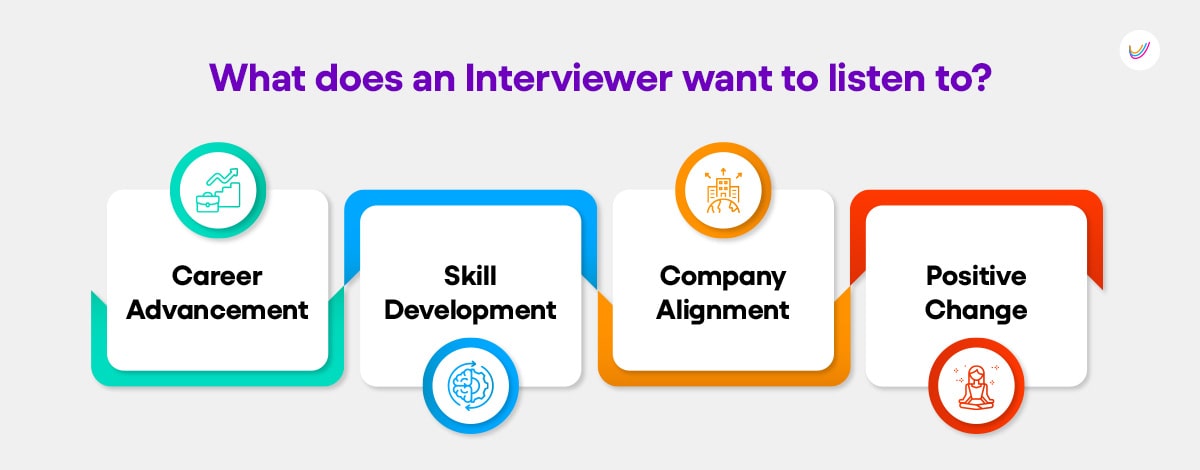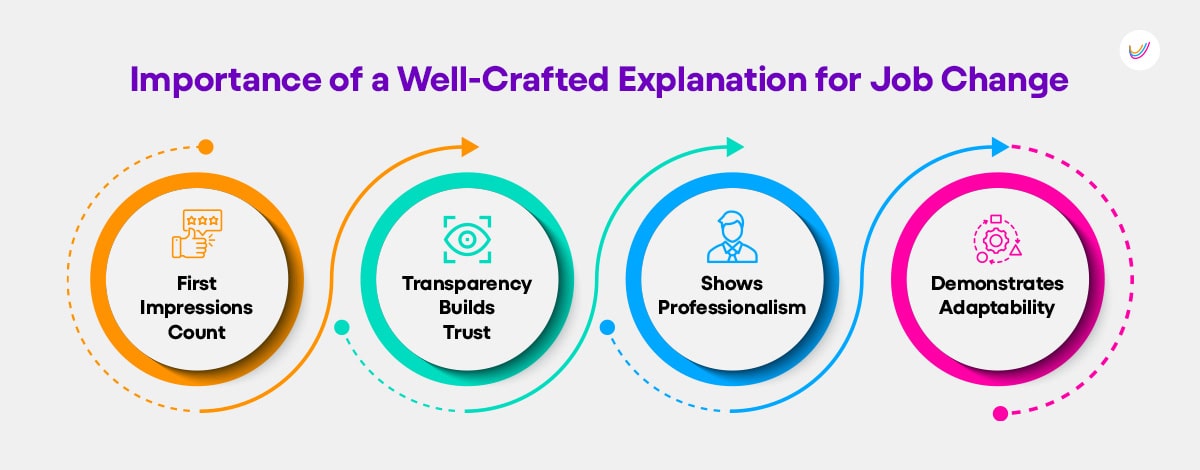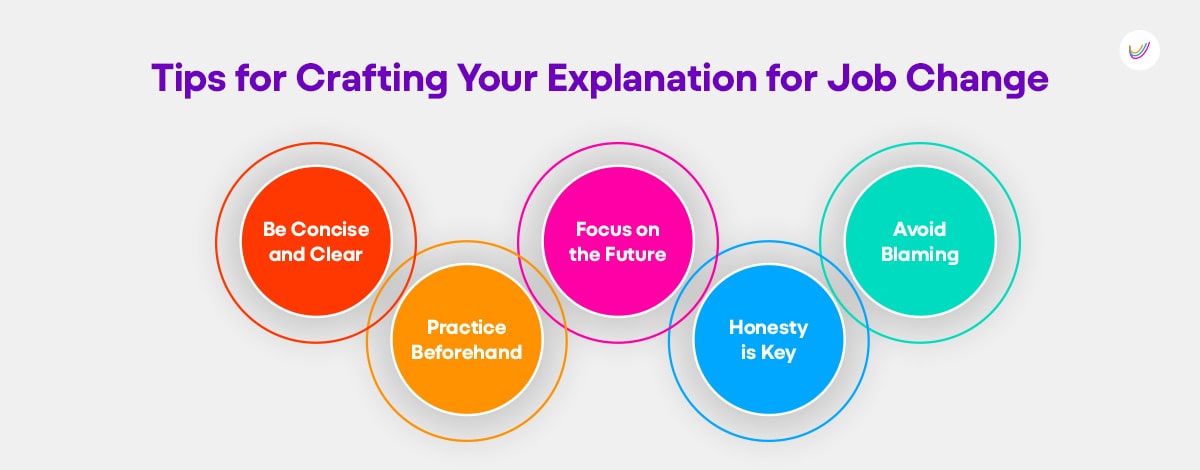One of the trickiest parts of a job interview is to explain why you’re changing jobs.
You want to come across as honest and authentic, but you also want to avoid raising any red flags for the hiring manager.
In this article, we will explore the best answers for career change to explain the reason for a job change, ensuring you come across as confident, authentic, and capable. After all, nailing this part of the interview can make or break your career transition.
How to Explain the Reason for Job Change?
Explaining the reason for a job change is a common aspect of a job interview or when discussing your career with others. Here’s a way to effectively explain your job change reasons:
- Be Honest and Transparent: Start by being honest about your reasons for leaving a job. Transparency is crucial to build trust.
- Focus on Positive Aspects: Emphasize the positive aspects of your decision. For example:
- Career Growth: “I was looking for new challenges and opportunities for career growth.”
- Learning and Development: “I wanted to expand my skill set and gain new experiences.”
- Company Alignment: “I was drawn to the company’s mission and values, which align with my own.”
- Mention Your Previous Role: Briefly explain your previous job role and what you accomplished there.
- Avoid Negative Comments: Avoid speaking negatively about your previous employer or colleagues. Instead, frame it positively, such as “I was looking for a different work environment.”
- Express Enthusiasm: Convey your enthusiasm for the new role and company. This shows that you’re excited about the change.
- Show How It Benefits the New Company: Explain how your experience and skills make you a valuable addition to the new company.
- Practice Your Explanation: Practice your response beforehand to ensure it flows smoothly and concisely.
Changing a job may be motivated by various factors, including:
- Better Growth Opportunities: Many seek roles that offer clearer or more promising paths for career advancement.
- Supportive Work Environment: A desire for a more collaborative, inclusive, or supportive workplace can be a powerful motivator.
- Alignment with Personal Values: Sometimes, individuals look to work for companies whose missions and values resonate more closely with their own personal beliefs.
When explaining your reason for job change, emphasizing these positive reasons—such as career advancement, professional development, or a desire for greater job satisfaction—can help present your decision in the best possible light. This broadens the range of motivations and shows a thorough understanding of why a job change might be necessary, making your explanation both comprehensive and relatable.
For example: “I decided to change jobs because I was seeking new challenges and opportunities for career growth. In my previous role at [Previous Company], I gained valuable experience in [mention your skills].
However, when I learned about the exciting projects and company culture at [New Company], I was eager to contribute my expertise and be a part of their team. I believe this change will allow me to further develop my skills and make a meaningful impact in my new role.”
Also Read: Switch A Job With A 3-Month Notice Period
What does an Interviewer want to listen to?
Recruiters want to hear concise and positive reasons for your job change. They are looking for reassurance that you’re making a thoughtful decision. In an interview, highlight the following:

- Career Advancement: Emphasize your desire for career growth and how the new role aligns with your long-term goals.
- Skill Development: Mention your eagerness to acquire new skills and experiences that your previous job couldn’t offer.
- Company Alignment: Explain how the new company’s values, culture, and mission resonate with you, making it an ideal fit.
- Positive Change: Describe the change as an opportunity for a positive shift and how it benefits both you and the new company.
For example: “I decided to change jobs because I’m driven by career advancement. My previous role at [Previous Company] provided a strong foundation in [mention your skills], but I was seeking new challenges and a chance to contribute more significantly. When I learned about the innovative projects and values at [New Company], I was excited about the potential for growth and alignment with my aspirations. I believe this change is a positive step in my career, and I’m eager to bring my skills to this dynamic team.”
This response highlights your motivation and how the new role aligns with your professional goals, making it appealing to recruiters in a concise manner.
Importance of a Well-Crafted Explanation for Job Change
Before delving into the best answers, it’s essential to understand why a well-crafted explanation matters. Your response can shape an employer’s perception of you, impacting your chances of securing a new position. Here are a few reasons why explaining your job change reason effectively is crucial:

1. First Impressions Count
How you articulate your reasons for changing jobs will be your first impression on potential employers. A well-thought-out response can set a positive tone for the rest of the interview.
2. Transparency Builds Trust
Honesty and transparency are highly valued in the professional world. Being forthright about your reasons for a job change can build trust between you and your prospective employer.
3. Shows Professionalism
A well-explained job change reflects professionalism and maturity. It demonstrates that you’re thoughtful about your career and have clear objectives.
4. Demonstrates Adaptability
In today’s dynamic job market, adaptability is a prized trait. Your ability to adapt and embrace change can be highlighted when you explain your job change reason convincingly.
“I firmly believe in continuous learning, and I am seeking a role that challenges me to adapt and grow. Your company’s commitment to innovation and learning aligns perfectly with my values, and I am eager to contribute to a culture that values professional development.”
These elements together showcase not only your readiness to handle change but also your proactive approach to personal and professional growth. By aligning your career moves with continuous learning and adaptability, you present yourself as a forward-thinking candidate ready to thrive in evolving environments.
You May Also Like: Tips to Prepare for Career Change Interview
Positive Sentiment Answers for Job Change: Examples
These answers highlight your job change in a positive light:
1. Seeking Career Growth and Development
One of the most common and respectable reasons for a job change is the pursuit of career growth and development. You can express your desire to take on new challenges and learn more in your field.
Example: “I’ve decided to make a job change because I believe it’s the right time to seek new challenges and further develop my skills and expertise. I’m eager to take on more responsibilities and contribute to a company’s growth.”
2. Exploring New Opportunities
Emphasize your curiosity about exploring new opportunities and gaining diverse experiences in your career. Mention your eagerness to broaden your horizons.
Example: “I’m in search of new opportunities that will allow me to expand my horizons and gain experience in different areas of my field. I believe it’s essential to continually learn and evolve in my career.”
3. Aligning with Personal Goals
Explain how your job change aligns with your personal goals and aspirations. This can include a desire for a healthier work-life balance, a shift in career focus, or aligning with your values.
Example: “My job change is driven by a desire to align my professional path with my personal goals. I’m looking for a role that allows me to maintain a healthy work-life balance while pursuing my passions.”
4. Looking for a Better Cultural Fit
Stress the importance of a positive workplace culture for your job satisfaction. Share how you’re seeking a company that aligns with your values and work ethics.
Example: “I value a positive and inclusive workplace culture, and I’m seeking a job change to find a company that aligns with my values and provides a supportive environment for its employees.”
5. Pursuing a Passion
If your job change is driven by a passion for a specific industry or role, make this your focal point. Enthusiasm for your new path can be contagious.
Example: “I’m excited about my job change because it gives me the opportunity to pursue my passion for [specific industry or role]. I’m confident that my enthusiasm for this field will drive my success.”
6. Overcoming Challenges
Mention how you’re proactively seeking to overcome challenges and expand your skill set. This showcases your determination to succeed.
Example: “I’ve realized that making a job change is essential for overcoming certain professional challenges and expanding my skill set. I believe it’s crucial to step out of my comfort zone to grow.”
7. Taking on More Responsibility
Share your desire to take on increased responsibility and contribute more significantly to your field. This demonstrates your commitment to professional growth.
Example: “I’m eager to take on more significant responsibilities in my career, which is why I’ve decided to make this job change. I believe I can contribute more effectively in a role that challenges me.”
8. Seeking Better Work-Life Balance
If work-life balance is a significant factor, explain that your job change is motivated by the pursuit of a healthier and more balanced lifestyle.
Example: “Work-life balance is a priority for me, and I’m making this job change to find a healthier balance that suits my personal and professional life. It’s essential for my overall well-being.”
9. Embracing New Technologies
In today’s tech-driven world, adapting to new technologies is essential. Express your desire to stay current and relevant in your field.
Example: “Staying updated with the latest technologies is crucial in my field. I’m excited about my job change because it allows me to adapt and embrace new technologies, ensuring my skills remain relevant.”
Negative Sentiment Answers for Job Change: Examples
These answers address job changes due to challenging circumstances:
10. Company Restructuring
In cases of company restructuring or downsizing, clarify that your job change is due to circumstances beyond your control.
Example: “My job change is a result of company restructuring that led to eliminating my position. It was a decision beyond my control, and I’m now seeking new opportunities. Being part of the recent downsizing at my previous company, my role was unfortunately removed. I am actively seeking new opportunities to leverage my skills and contribute to the success of a forward-thinking organization.”
People Are Also Interested In: The 10 Worst Mistakes Career Changers Make
11. Incompatibility with Company Values
If your values no longer align with your current employer, it’s important to highlight your commitment to maintaining your personal integrity.
Example: “I’ve realized that my values no longer align with my current company’s values and direction. To maintain my personal integrity, I’ve decided to make a job change.”
12. Toxic Work Environment
When the workplace becomes toxic or harmful, it’s crucial to emphasize your well-being and mental health as the driving factors behind your job change.
Example: “A toxic work environment has been detrimental to my well-being and mental health. It’s the primary reason for my job change, as I prioritize my health and happiness.”
13. Lack of Growth Opportunities
If your current job lacks growth prospects, mention how your job change is necessary to advance your career.
Example: “I’ve come to a point in my career where I need more growth opportunities to reach my potential. My job change is necessary to advance and continue my professional development.”
14. Work-Life Imbalance
Explain that you’re looking for a healthier work-life balance and that your current job doesn’t allow for it.
Example: “My current job doesn’t provide the work-life balance I need to thrive in both my personal and professional life. This job change is aimed at achieving that balance.”
Combination of Sentiments for Job Change Explanation
These answers blend positive and negative sentiments to explain your reason for job change:
15. Relocation
When relocating for personal reasons, you can explain how your job change is a mix of excitement for a new chapter and the necessity of adapting to change.
Example: “I’m excited about the prospects of relocating to a new area for personal reasons. This job change represents a mix of embracing a new chapter in my life and adapting to change professionally.”
16. Family Reasons
If your job change is driven by family reasons, stress the importance of supporting your loved ones while seeking professional fulfillment.
Example: “Family reasons are a driving force behind my job change. It’s crucial for me to support my loved ones while also finding professional fulfillment in my career.”
Best Answers for Recent Graduates to Explain Job Change
New graduates can provide these answers when changing jobs:
17. Finding the Right Fit
Highlight the importance of finding the right job fit after graduation—express eagerness to explore different roles and industries.
Example: “As a recent graduate, my priority is finding the right job fit that aligns with my education and aspirations. I want to explore different roles to make informed career choices.”
18. Gaining Diverse Experiences
Explain that you want to gain diverse experiences early in your career to make more informed choices down the road.
Example: “I believe that gaining diverse experiences early in my career will be invaluable in shaping my professional journey. My job change is about broadening my horizons.”
19. Pursuing Your Passion
Emphasize your pursuit of a career that aligns with your passion and the valuable skills you aim to develop.
Example: “Passion is a driving force for me, and I’m pursuing a career that aligns with what I love. My job change represents the opportunity to develop my skills in a field I’m passionate about.”
20. Exploring Different Industries
Mention your desire to explore different industries and roles to discover where your talents and interests align best.
Example: “I want to explore various industries and roles to discover where my talents and interests align best. My job change is about seeking new experiences to find the perfect fit.”
Also Read: Successful Career Change at 40: Step by Step Guide
Tips for Best Answer for Reason for Job Change
Now that you have a variety of answers to choose from, here are some tips for crafting your response effectively:

1. Be Concise and Clear
Keep your explanation concise and to the point. Avoid going into unnecessary details that might sidetrack the conversation.
2. Practice Beforehand
Practice your response to ensure it flows smoothly and confidently during interviews. This can help reduce anxiety.
3. Focus on the Future
Shift the conversation toward your future goals and how your job change aligns with them. This keeps the discussion positive.
4. Honesty is Key
Always be honest in your response. Integrity is highly valued by employers.
5. Avoid Blaming
If your job change is due to negative circumstances, avoid placing blame on others or your previous employer. Focus on your growth.
Dos and Don’ts for an Interview
Dos and Don’ts for an interview when explaining your reason for a job change:
| Dos | Don’ts |
| 1. Be concise and to the point. | 1. Don’t speak negatively about your previous employer. |
| 2. Highlight your enthusiasm for the new role. | 2. Avoid giving vague or unclear reasons for your job change. |
| 3. Emphasize your desire for career advancement. | 3. Don’t focus solely on personal reasons for leaving, keep it professional. |
| 4. Explain how your skills align with the new position. | 4. Avoid discussing unrelated issues or conflicts from your previous job. |
| 5. Mention your eagerness to learn and develop. | 5. Don’t criticize your former colleagues or team. |
| 6. Discuss how the new company’s values resonate with you. | 6. Don’t dwell on the negative aspects of your previous job. |
| 7. Frame the change as a positive step in your career. | 7. Avoid exaggerating or providing false reasons for the job change. |
| 8. Show how the new role benefits both you and the company. | 8. Don’t overcomplicate your explanation with too many details. |
| 9. Align your reasons with your long-term career goals. | 9. Don’t sound indecisive or unsure about your decision. |
| 10. Practice your response to ensure it flows smoothly. | 10. Don’t forget to listen to the recruiter’s questions and respond appropriately. |
FAQs on Best Answers to Explain Reason for a Job Change
Q1: Why is explaining the reason for a job change important?
A1: It’s essential because your response can shape an employer’s perception of you, impacting your chances of securing a new position.
Q2: What are the key positive sentiments to convey when explaining a job change?
A2: Positive sentiments include career growth, skill development, company alignment, enthusiasm, and a focus on opportunities and passions.
Q3: How should recent graduates explain their job change?
A3: Recent graduates can emphasize finding the right fit, gaining diverse experiences, pursuing their passion, or exploring different industries.
Q4: What should you avoid when explaining a job change in an interview?
A4: Avoid speaking negatively about your previous employer, giving vague reasons, focusing solely on personal issues, criticizing former colleagues, dwelling on the negatives, and sounding indecisive.
Q5: How can you effectively shift the conversation toward your future goals during the explanation?
A5: Focus on how your job change aligns with your future objectives and how it benefits your professional growth.
Article You May Also Like: Job Description vs Job Specification: 5 Key Differences




